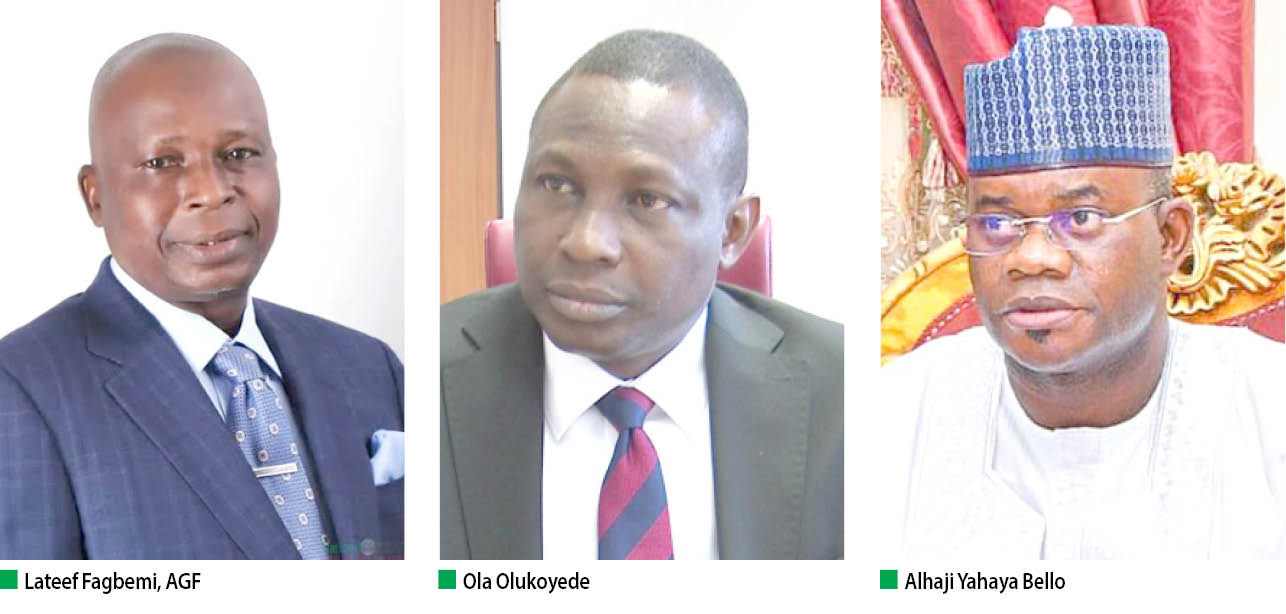Legal analysts believe that the blurry lines of the principle of subjudice in Nigeria’s procedural jurisprudence may have been breached by the events of the last few weeks in the case of the Economic and Financial Crimes Commission (EFCC) and a former governor of Kogi State, Yahaya Bello.
The controversy over the attempt to bring Bello before a Federal High Court in Abuja to face charges of alleged mismanagement of the sum of N80.2billion state funds has informed the concerns that the EFCC may have acted contemptuously of Kogi High Court.
“Subjudice” and “contempt ex facie curiae” are time-honoured judicial principles that prohibit public discussion of pending substantive issues and actions that disrespect the court’s authority in a matter respectively. Some ancillary pillars of proceedings in a democracy are fair trial, fair comment and free speech as covered in sections 35 and 39 of the 1999 Constitution (as amended).
Legal analysts believe that the matter having attracted many opinions, conclusions and verdicts from various strata of society even before it had begun would redefine the concept of subjudice and contempt in the country’s jurisprudence.
- Kwara celebrates students with impressive UTME scores
- HYPPADEC inaugurates N420m flood control project in Kogi
Earlier, Bello filed a contempt application seeking to commit the EFCC chairman, Ola Olukoyede, to prison over actions taken during the pendency of the matter.
Counter orders from courts of coordinate jurisdiction
Ex-governor Bello was in 2023, while still serving as governor, cited in amended charges of the EFCC in the pending trial of his nephew and now Chief of Staff to the state government, Ali Bello and one Dauda Suleman in an alleged fraud shortly before he assumed office in September 2015.
The anti-graft agency alleged that the defendants used a bureau de change operator known as Rabiu Misa Tafada and a company, E-Traders International Limited, to conceal some of the transactions.
Following his handover of office to his successor, Usman Ododo, on January 27, the EFCC filed a 19-count charge against Bello before a Federal High Court in Abuja and applied for substituted service and a bench warrant.
The imbroglio became more protracted on April 17 when operatives of the anti-graft agency laid siege on the residence of the former governor in Abuja with the agency claiming his supporters, including the incumbent governor, Ododo, obstructed moves to arrest him.
At the same time, a Kogi State High Court in Lokoja issued an interim order restraining the EFCC from arresting and detaining Bello, while a Federal High Court in Abuja okayed his arrest.
Justice I. A. Jamil delivered the initial ruling in a fundamental human rights enforcement suit by Bello, through his counsel, S.A. Abbas, challenging EFCC’s move to arrest him over alleged money laundering.
Justice Jamil, in suit no HCL/68/M/2020, had restrained the EFCC from arresting, detaining and prosecuting the applicant except as authorised by the court.
But a Federal High Court in Abuja on the same day issued a warrant of arrest for the arrest of the ex-governor following an ex-parte application filed by the EFCC on April 17.
The EFCC counsel Kemi Pinheiro (SAN) also threatened that the commission could summon the military to effect the ex-governor’s arrest if need be.
It was learnt that the EFCC, which had earlier filed an appeal against Bello’s restraining order before a Kogi State High Court presided by Justice Isa Abdullahi, asking the appellate court to set it aside for lack of jurisdiction, had abandoned it before going to the Federal High Court in Abuja for a bench warrant.
In the appealed interim order on the enforcement of Bello’s fundamental rights dated February 9, Justice Abdullahi directed the EFCC to bring to a Federal High Court any such criminal charge where he was reasonably believed to have committed any offence “provided that the respondent shall not invite or detain the applicant on account of a reasonable belief that the applicant (Bello) has committed any financial crime, without first obtaining the leave of a superior court of record, especially having regard to the antecedents of the respondent (EFCC) in the manner it has managed its engagements with the applicant.”
With the contempt proceedings pending before the Kogi High Court, the EFCC Chairman again approached the Court of Appeal in Abuja with an ex parte order for the court to stay proceedings on the matter.
Interestingly, the appellate court, on Friday, May 3 approved the request to serve its processes on the former governor by substituted means and fixed May 20 for the hearing of the matter.
Some more serious developments in the trial unfolded when Olukoyede, on April 23, addressed a press conference where he detailed how the former governor disregarded invitations, including his phone call.
He further revealed that Bello transferred $720,000 from the government’s coffers to an international school, the American International School, Abuja (AISA) as advance fees for his children.
The commission later reported on April 27 that the school had refunded the sum following a correspondence between the two sides.
It is wrong to act on matters before the court – Lawyers
Lawyers have weighed in on the controversy, expressing concerns that the EFCC may have gotten the whole exercise wrong.
While reacting to the development on Channels TV, a former Vice President of the ECOWAS Court, Professor Chijioke Nwoke, said the EFCC subjected Bello to some form of a media trial.
“An institution of justice should be in a position, especially when you are the investigator, to carry out a discrete investigation. You do not need to involve the media,” he said.
Similarly, a human rights lawyer Nkereuwem Akpan Esq called for the sack of the EFCC chairman for secretly inviting Bello to the commission through the backdoor “without any official invitation extended to him” and “acts of thuggery and brigandage” by the commission’s staff, which he described as a gross abuse of the oath of office.
A former Attorney General and Commissioner for Justice in Ekiti State, Dayo Akinlaja (SAN), said anything that amounts to reduction of the honour and dignity of a court of law amounts to contempt of court.
“Ditto, imputing bias or attempting to pre-empt the decision in a pending matter in a manner that is derogatory would equally precipitate a charge of contempt,” he said.
On his part, Abeny Mohammed (SAN) said it is axiomatic that when a matter in dispute is before the court, parties thereof are obliged not to comment publicly on the substance of the dispute before the court.
“It is generally agreed that such matters in dispute before the court are sub-judice. Parties having submitted their grievances before the court for adjudication are precluded from making further comments in private or public on the matter so as not to prejudice the court’s eventual decision on the matter.
“The issue of contempt hardly arises from comments per se on a matter before the court. Contempt of court will, however, occur or arise where the comment is made to subvert a positive order made by the court to ridicule or render the court’s order nugatory or ineffectual.”
Similarly, a former Peoples Democratic Party (PDP) presidential spokesman and legal practitioner, Daniel Bwala, said the action of the EFCC chairman amounted to a media trial against former governor Yahaya Bello.
Speaking on Arise TV, Bwala said “If you give a forensic analysis of what he said in the press yesterday, a right-thinking member of the society would say this was a planned script to give Yahaya Bello an escape route.
“Why did I say that? One, the trial in Nigeria is a trial not by jury. Even trial by jury is not a trial by the media.
“Two, having submitted a charge to court with the evidence that he has been granted an order of substitution and he has served Yahaya Bello through his counsel, he has submitted to the jurisdiction of the court. Was there any need to hold a meeting and begin to argue the substance of the charge?
“Three, some of the things he said yesterday has created more doubt and fed into the allegation of Yahaya Bello that he would not seek justice because it was a persecution.”
An Abuja-based lawyer, E.M.D. Umukoro Esq, said contempt of court arises from acts of saying or doing something that impugns the reputation of the court in the eyes of the public, adding that granting interviews ought to wait till after the judgement.
“Once a matter is before the court, it is said to be subjudice, in other words, it is before the court. Therefore, parties are not expected to say anything or do anything concerning that matter that is before that court,” he said.
Court order won’t stop Bello’s prosecution – Falana
Human rights lawyer Femi Falana (SAN) has argued that no court has the jurisdiction to stop the arrest and prosecution of former governor of Kogi State, Yahaya Bello, over the alleged misappropriation of N80.2 billion.
In his reaction, Falana said, “by Section 35(1) (c) of the Nigerian Constitution, 1999, the police, anti-graft agencies and other prosecutorial bodies cannot be prevented by a court of law from arresting a criminal suspect once there is reasonable suspicion that he or she has committed a criminal offence.”
He said the Supreme Court had pointed out that the order of a high court to the effect that a criminal suspect should not be arrested cannot bar a court of coordinate jurisdiction from trying him.
An Abuja-based constitutional lawyer, Godwin Sunday Ogboji Esq, has called on the EFCC chairman to make good his threat and ensure that the former Kogi State governor is properly prosecuted according to the law.
“Olukoyede is on course on Bello’s matter and should carry out proper investigation to ensure diligent prosecution in the offences in which the ex-governor is being accused,” he said.
In the course of the controversy, the Attorney General of the Federation (AGF) and Minister of Justice, Lateef Fagbemi (SAN), has warned against obstructing the law while calling on any summoned suspect to report themselves to the law enforcement.
“I state unequivocally that I stand for the rule of law and will promptly call EFCC and indeed any other agency to order when there is indication of any transgression of the fundamental rights of any Nigerian by any of the agencies but I also tenaciously hold the view that institutions of state should be allowed to function effectively and efficiently,” he said.
It is expected that the matter would still be determined by the court where parties have joined issues and in line with the constitution and the rule of law.

 Join Daily Trust WhatsApp Community For Quick Access To News and Happenings Around You.
Join Daily Trust WhatsApp Community For Quick Access To News and Happenings Around You.


